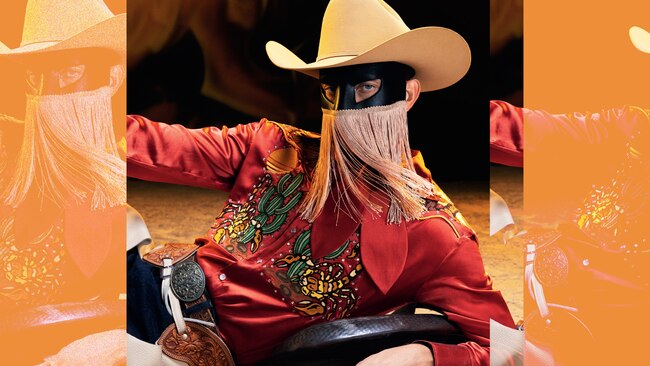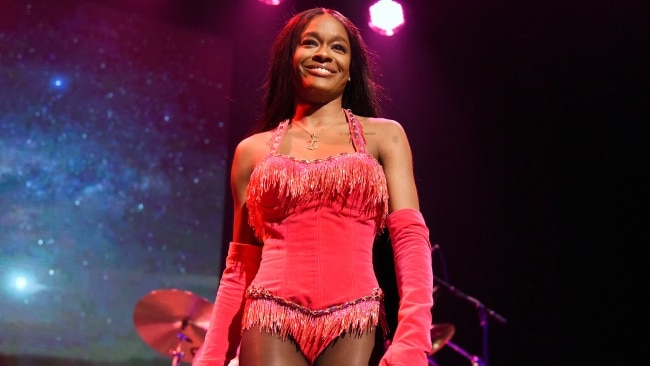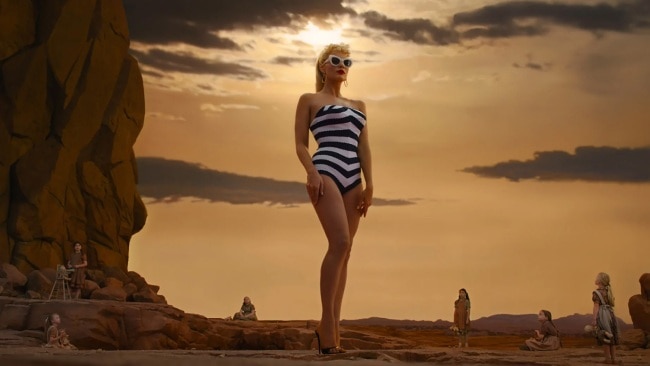The man behind THAT Euphoria scene
Why Orville Peck almost quit music altogether during Covid.

Why Orville Peck almost quit music altogether during Covid.
The second season of Euphoria is full of spine-tingling scenes. But one – known among fans of the Binge series simply as ‘the car scene’ – is particularly chilling.
It’s where Nate (Jacob Elordi - who we interviewed over here) is driving down the highway at breakneck speed, his eyes not on the road but fixed firmly on his passenger, Sydney Sweeney’s all-American beauty, Cassie. As the speedometer surges, Nate turns up the radio. Three menacing guitar chords echo through the vehicle, followed by the inimitable croon of the South Africa-born, Canada-based country singer who goes by the pseudonym Orville Peck.
The song is none other than Dead of Night, a dark but beautiful ballad from the musician’s 2019 breakout album, Pony. The moment the episode aired, Peck’s streaming numbers began to climb and climb. Overnight, the singer, who never appears without his trademark fringed mask, went from an alternative figure beloved by progressive country music fans to gen Z’s new favourite artist. The timing was serendipitous – the episode aired right as the rollout of Peck’s second album, Bronco, kicked off. Right now, Peck is taking Bronco on around-the-world tour, which will see him play shows in Australia this July. On the eve of his return Down Under, we catch up with the artist giving country music its cool.
VOGUE AUSTRALIA: First up, we have to ask about the inspiration behind your album and EP titles, Pony, Show Pony and now Bronco. Do you ride horses
ORVILLE PECK: “I didn’t ride growing up, only because we couldn’t really afford it. But I ride horses any chance I get now, I’ve always loved them. I’m like a thirty something gay horse girl.” (Laughs.)
VA: Lyrically, there’s a lot of light and shade on the album. Is this reflective of what was happening in your life at the time?
OP: “Yeah, it is. I went through a really big change in my life when Covid hit. Work stopped and I was forced to reckon with the fact I was really, really unhappy – my personal life was hell – but I’d been distracting myself by escaping into my work. I was really depressed and anxious. But when everything stopped, it sort of allowed me the space to look at the rest of my life, and the way I came out of that hole was to get back into what I’ve always done. Music is a form of getting my feelings out and getting back to myself.”
VA: When you started writing again, did you know those songs would form your next album?
OP: “I didn’t. I essentially used writing as a form of therapy and catharsis, to come out of this dark period where I almost stopped making music altogether. I approached it with … I’m trying to think of the right word here … with a sense of freedom, almost desperation, because I went into it with no other expectation other than what I was feeling. Which is a hard place to get to, especially when there’s the pressure of an audience and what people are expecting.”
VA: Was there a lot of pressure, after the breakout success of Pony?
OP: “I did feel nervous I wasn’t going to be able to live up to making an album that would be as well received as Pony. I was giving too much thought to this expectation that often comes with a second album.”
VA: How did you push past that?
OP: “There’s a couple of songs on the album that are super personal, and I’m a little bit mortified that people are going to hear them. But eventually, I just decided to say, fuck it. I’m going to sing about this stuff. I feel vulnerable about it, but it was what I had to do.”
VA: You entered country music as a bit of an outsider. Do you feel like you’re becoming more accepted by the establishment?
OP: “I think I am. But I think that’s been due to the fact I sort of do my own thing. I’ve always approached my place in country music as just that; it was like in my own mind, I had a seat at the table, and I belonged in it. I just sat down, and I think people are finally starting to accept I sit there. I suppose I’ve just been authentic.”
VA: This issue is themed around love. Why do you think country music is such a powerful vehicle for exploring romance?
OP: “I feel like we’re acutely aware of love when we’re either not getting it, or we’re losing it. Which is a very country trope. A lot of country songs have been written about that – loss and grief and heartache. But you know, I still maintain I’ve never written a love song.”
VA: Never?
OP: “Well, all my songs are about heartbreak, mostly. The songs I have written about love are usually about a more abstract form of love, for a place I love, or nostalgia for a time I loved, or an experience that’s gone. I think some of my deepest heartbreaks haven’t been over a person; there’s way worse heartbreak than romantic heartbreak. I’ve never written a love song in the sense of like,‘I’m singing about this man whom I love.’”
VA: Mystery and intrigue play a big role in love and intimacy. How does your disguise fare with potential suitors?
OP: (Laughs). “Like, do I show up to dates wearing my mask?”
VA: Do you?
OP: “It depends on the context of the date, I suppose. But yes, I would say that the people I’ve chosen to date have definitely seen behind the mask.”
VA: Hearing Dead of Night play on Euphoria was thrilling. How has that cameo impacted your celebrity?
OP: “It’s funny, because that’s been my most popular song for a while now, but it was popular in a culty, niche way. So to have the show introduce it to more of a mainstream audience, it was really cool. And the writer essentially wrote the scene to the song, so it was almost like a little mini music video in itself. There was no dialogue over the scene, and Nate was like, turning it on in the car. It was this beautifully thought-out moment. It felt like the song was really incorporated into the show’s world for a moment.”
VA: How does it feel being back on tour with the perspective you gained while writing Bronco?
OP: “My overall happiness … It’s like night and day. It’s been so exciting playing these new songs for everyone. I mean, I hope it doesn’t go south again (laughs), but it does feel really different. I’m still working on myself every day, but I feel like I’m in a much better place as a person. Nowadays, I’m just authentically happy.”
Orville Peck will play shows in Melbourne and Sydney in July.
Vogue Australia July is on newsstands now.



